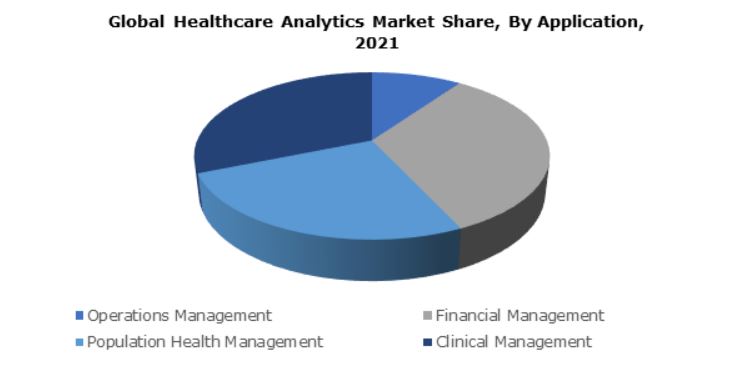Healthcare Analytics is one of the fastest-growing fields, as healthcare companies need a regular supply of analytics professionals. Healthcare organizations aim to provide more patient-centered care and evidence-based practices while reducing costs, reducing medical errors, and improving clinical quality of care and patient safety.
Healthcare analytics professionals make it easier for organizations to realize the above objectives and other business goals. Naturally, hiring managers in such companies need a regular influx of talented healthcare analytics professionals. As per a report by Global Market Insights, the healthcare analytics industry is expected to grow at a Compounded Annual Growth Rate of 11.3%, from a value of $12.3 billion in 2021 to $32.7 billion in 2030.
The below infographic shows the global healthcare analytics market share by application.

Source: Global Market Insights
The current job market has many highly skilled analytics professionals, but still, healthcare companies find it challenging to recruit them.
Healthcare Analytics Hiring Best Practices
A report by Healthcare Informatics Research pointed out that almost half (48%) of healthcare companies have gained some analytical experience, whereas 16% have significant experience and view it as a business norm. As a result, other organizations try to follow suit and be the most analytically advanced companies in their space. Hence, they require a constant influx of talented healthcare professionals, and corporations must focus on retaining them after a successful hire.
However, hiring and recruiting the most talented healthcare analytics professionals is not easy. So, hiring managers from these enterprises should focus on the best practices for healthcare analytics mentioned below.
1. Post on Niche Job Boards
Companies post on famous job boards like Indeed, Linkedin, and Glassdoor. These recruiting platforms are undoubtedly good and will attract hundreds of talented candidates, but there’s a big downside to hiring from here. It will be a daunting task to sort through hundreds of applications, most of which would not have the desired qualifications.
Hence, healthcare companies should take a more specialized and targeted approach to recruit the best healthcare analytics talent. They can do this by posting jobs on niche platforms and boards that work specifically with the healthcare industry. Benchpoint is one platform where healthcare corporations can find the best candidates for the most technically dominant jobs in healthtech analytics.
2. Focus on Employer Branding
Employer branding is the process of managing and influencing how job seekers, employees, and other vital stakeholders perceive you as an employer. It includes everything you do to promote your business as a top employer. Employer branding and advertising are critical in recruiting the top healthcare analytics professionals.
Healthtech analytics is a highly technical field that is constantly evolving and focuses intensively on research and development. Hence, candidates want to work for a healthcare company with a high brand value among potential employees and has a reputation for investing in research.
Today’s analytics professionals want to be a part of the ongoing healthcare revolution and play an active role in transforming the industry as a whole. For instance, a company with a reputation for providing a harsh work environment and poor benefits will find it significantly harder to attract top healthcare analytics talent.
Edward E. Lawler, a Distinguished Professor of Business and Director of the Center for Effective Organizations in the Marshall School of Business at the University of Southern California, says,
“Employees seek to work for organizations just as customers seek to do business with them: when they feel that the organization offers what they desire.”
Healthcare organizations can strengthen their employer brand by building a company blog, having a solid social media presence, and encouraging current employees to be brand ambassadors.
3. Consider Investing In a Recruiting Software
Recruiting software aids businesses in streamlining the hiring procedure from prospect attraction to offer letter distribution.
Although different, applicant tracking systems (ATS) and recruiting software are frequently used interchangeably. Global companies make use of state-of-the-art recruitment applications that save lots of time and resources for the hiring manager.
A report by Capterra pointed out that roughly 75% of companies use recruitment or application tracking software to refine the hiring process. The below infographic shows the satisfaction rate of those who used such software in their recruitment process.

Source: Capterra
4. Offer Better Benefits and Compensation
Healthcare analysts are among the highest-paid professionals in the current scenario and other data-intensive roles like data engineers, scientists, and bioinformatics professionals.
As per reports, the average salary of a healthcare analytics professional in the US is $84,997, with the most experienced candidates earning up to $120,000 per year. However, healthcare corporations must look beyond the traditional benefits and compensation and offer something extra to attract the best talent.
The majority of firms provide additional benefits like health insurance, bonuses, and others, along with the base salary. The aforementioned statistics show that companies are willing to pay the most for the finest healthcare analytics experts. They need to provide something exceptional if they want to attract the best healthcare analytics candidates to their business.
Businesses that place a high priority on their employees’ mental, physical, and emotional health have a competitive advantage. Companies should consider giving employees time off to unwind and recover because burnout is spreading across all industries.
5. Ensure Every Candidate You Consider is a Good Fit
Healthcare analytics is a data-driven and highly technical field, combining the disciplines of medical applications and data analytics. Hence, hiring managers should focus on applicants with adequate skills and competencies to excel in a healthcare environment. Here are the most in-demand skills for healthcare analytics professionals.
- Data Analysis
- Data Mining and Modeling
- Structured Query Language
- Basic Understanding of Medical Subjects
- Data Visualization Tools
- Export, transform, and load (ETL).
Hiring managers should also be well-versed in the above-mentioned skills and competencies to assess potential candidates for an efficient recruitment process. The entire hiring process should be framed in such a way that it highlights the candidate’s ability to display the skills mentioned above and how they’ll use them in a competitive business environment.
6. Write Effective Job Descriptions
The typical candidate submits multiple applications when seeking an excellent healthcare analytics job. As a result, the majority of candidates for healthcare analytics positions take a cursory look at each opportunity and often scan the job descriptions. Long, boring job descriptions frequently strike these aspirants as a significant obstacle and unattractive.
Short, to-the-point job descriptions should be written by hiring managers and recruiters. Hiring managers should briefly mention the functions and responsibilities of the healthcare analytics applicant in these job descriptions, which should clearly state what the organization is seeking.
Additionally, employers should refrain from using technical jargon and ambiguous language in job descriptions for healthcare analytics positions because it may turn off prospects. If you want to draw in the best healthcare analyst candidates, you should write a job description that is straightforward, clear, and easy to understand.
When employers are aware of what candidates are looking for, attracting and keeping healthcare analytics candidates is not as challenging. Companies may entice and retain the most outstanding healthcare analysts in the globe by employing the strategies and best practices listed above.
Don’t forget that hiring involves a commitment in addition to attracting and hiring employees. To learn more about how to uncover the most exceptional healthcare analytics professionals in a lot less time, get in touch with BenchPoint, a healthtech recruitment firm.
